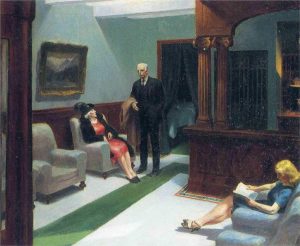 While reading “The Truth About What Happened” by Lee Child, there were a few things that popped out at me (especially after reading “Soir Bleu” right before it). Some of these were very obvious, such as the author’s choice to use dialogue for the primary structure of the piece, but there were other details and interpretations that I personally experienced and would like to point out.
While reading “The Truth About What Happened” by Lee Child, there were a few things that popped out at me (especially after reading “Soir Bleu” right before it). Some of these were very obvious, such as the author’s choice to use dialogue for the primary structure of the piece, but there were other details and interpretations that I personally experienced and would like to point out.
The first, of course, is the structure of the piece. As I have previously mentioned (and you all have read), the story of “The Truth About What Happened” is shared almost entirely through spoken dialogue between Albert Anthony Jackson, an FBI agent and the main character that we follow, and Slaughter, Vanderbilt’s boss and the one leading the interview/deposition with Jackson. This encounter came after Jackson had done a previous deposition, though one that is entirely off the record. This gets explained as the interview goes on. The main thing that stood out to me was the use of near constant dialogue. There are plenty of times when it becomes difficult to understand who’s saying what; this can effect the overall flow and speed of the story, but I feel like it’s actually really fitting here. Since it is a deposition-style interview, it’s supposed to feel contained and almost sterile, in a way. In addition, it gave me the feeling of being in a dark interview room – the lack of description of the room itself gave me the ability to make my own.
Another thing that really stood out to me was the overall theme of the story. It starts with Albert Anthony Jackson leaving one deposition to go right into the other, when they’re really two sides of the same coin. As Jackson explains the story of him and Mr. Hopper trying to learn more about Sherman Bryon, who they were looking at “recruiting.” As they continued their search and more information was revealed, I couldn’t help but feel a sense of dread as I waited for something bad to happen, either to Jackson or Mr. Hopper themselves or between the relationship of Sherman Bryon and these two mysterious women. Except… nothing happened. What was believed to be a cheating scandal ended up being a time out between Mr. Bryon, his wife, and mother-in-law. It wasn’t until the very last paragraph when it was reveled that Mr. Bryon was dead that my feeling of dread was recognized in any way.
Finally, there’s the ending, and specifically how the ending ties in with the beginning. In a literal sense, both points are Albert’s closing thoughts about how well he did during each deposition. However, each deposition is a retelling of the same story, since it was my understanding that the first deposition at the beginning of the story was the one that was required after Mr. Sherman Bryon’s death. It is this full circle that surprised me and it was very satisfying to recognize.
I felt a similar sense of dread, though it continually faded as the story exceeded my expectations; there were things constantly being revealed, but nothing happened. I felt confused about the fact that nothing happened, yet it was revealed that Mr. Byron was dead. There was a part of the story that we did not get from the narrator that I couldn’t help but feel that he had the answer to.
I hadn’t thought of the dialogue creating a contained feeling, but I completely agree. With such a long stretch of only talking, it kind of replicates what I imagine the narrator was feeling — being utterly focused on the interview and not saying the wrong thing, to the point where nothing else matters.